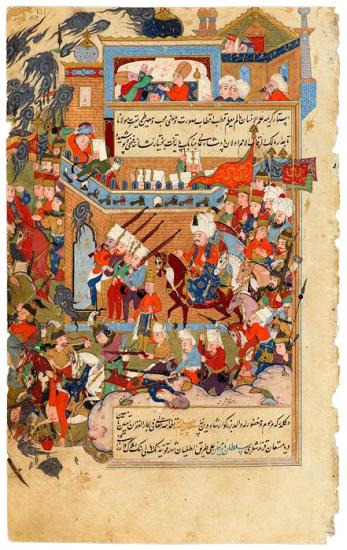
Konya, Besieged During a Fight for the Throne of Sultan Sūleyman's Two Sons, is Protected by Clouds of Salt
Tarjuma-i Thawāqib-i manāqib (A Translation of Stars of the Legend), in Turkish
The translation was ordered in 1590 by Sultan Murād III (r. 1574–95) from the Persian abridgement of Aflākī.
Purchased by Pierpont Morgan, 1911
This scene depicts a miracle that occurs during a 1559 battle between Princes Selim and Beyazid, the two sons of Sūleyman (r. 1520–66) who were vying for the throne. During the battle, the city of Konya is miraculously protected by clouds of salt that emanate from the green-domed tomb of Rūmī and rain down on Prince Beyazid's soldiers, causing them to flee. Here the victorious Selim rides on horseback, while members of the Mevlevī order offer prayers in a room at the top. Beyazid sought refuge with the Safavids, but in 1561 Selim paid to have him strangled, paving his own way to the throne (r. 1566–1574).
This miniature appears in a manuscript of a sixteenth-century Turkish translation of a fourteenth-century life of Rūmī. Since the siege depicted here took place in 1559—many years after the original text was written—this story must have been added by the translator Darvīsh Maḥmūd.
Rūmī, Persian Mystic And Poet
The sixteenth-century miniatures presented here concern the life and miracles of Jalāl al-Dīn Rūmī, called Mē vlāna (Our Master), the most famous member of the Mevlevī order and Persia's greatest Sufi mystic and poet. He was born in Balkh in 1207, but his family emigrated after his father foresaw the Mongol conquest. They eventually resettled in Konya, Turkey, then the capital of Anatolian Rūm (thus Rūmī), where the poet died on 17 December 1273.
Several Persian accounts of Rūmī's life have been written, the first by his son, Sultan Walad. The third, laden with moralizing miracle stories, was ordered by Rūmī's grandson Ulu ˓Ārif Chelebi. It was written by the dervish Shams al-Dīn Aḥmad, called Aflākī (d. 1360). Aflākī also incorporated verses from Rūmī's works, notably his six-volume Masnavī (a poetical form of rhyming couplets) and the Dīvān-i-Shams al-Dīn Tabrīzī, named after Shams of Tabriz, the mystic who changed Rūmī's life and transformed him into a poet when they met in 1244.
In 1590—three and a half centuries after Aflākī wrote his life of Rūmī—the Ottoman sultan Mūrad III ordered a Turkish translation of a 1540 abridged version of Aflākī's text entitled Tarjuma-i Thawāqib-i manāqib (Stars of the Legend). The translator was Darvīsh Mahmud Mesnevī Khān of Konya. Two illustrated copies of the Murād translation, both made in Baghdad, survive. One, dated 1599, is held by Topkapi Palace, Istanbul, and has twenty-two miniatures. The other, richer manuscript is held by the Morgan. It dates to the 1590s and includes twenty-nine miniatures. They are all featured here, along with two folios from other collections that are believed to have once been part of the Morgan manuscript.
